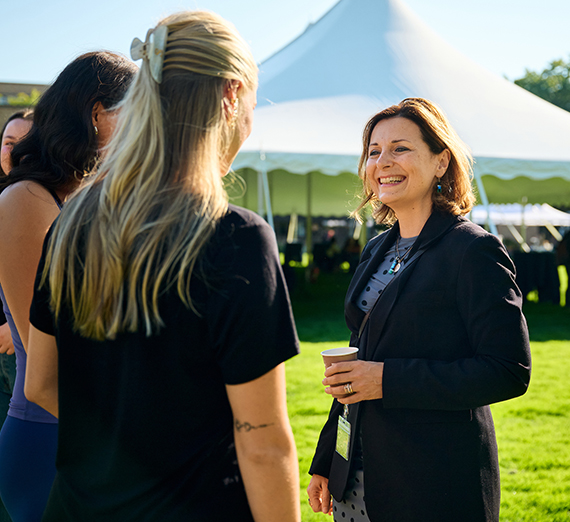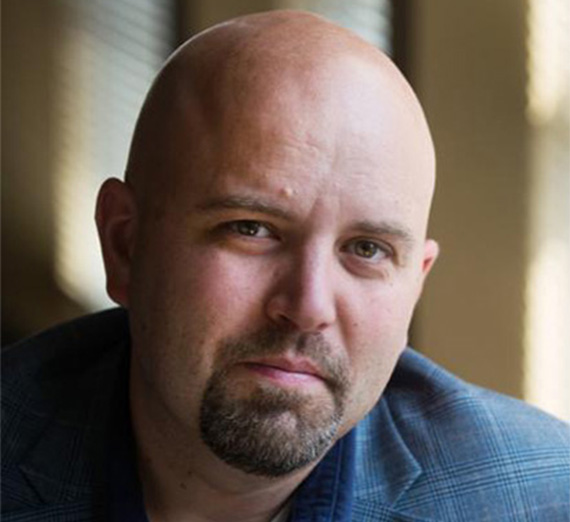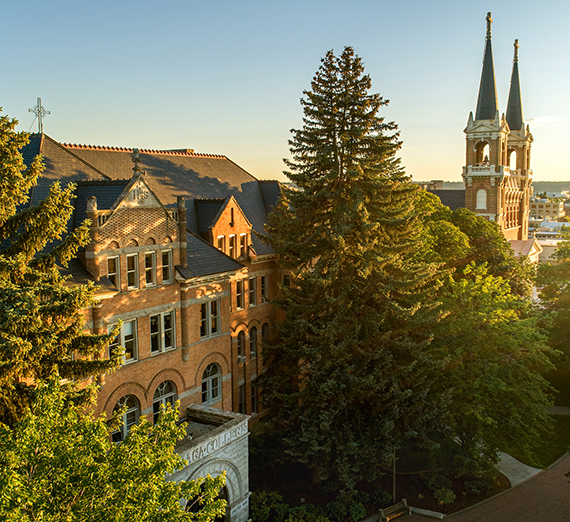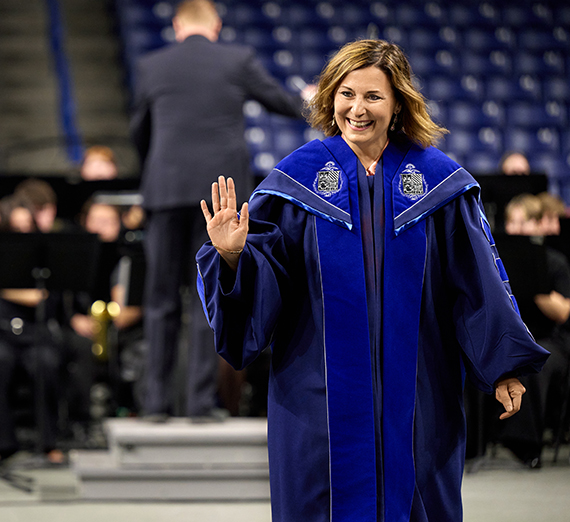Making Our Mission Possible
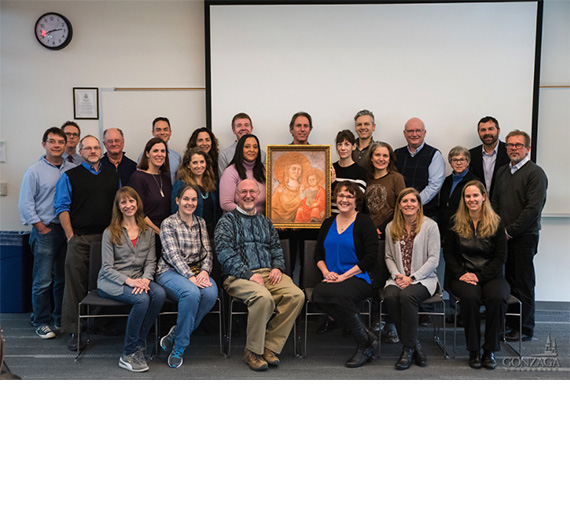
We all approach this goal in a unique and special way, and like the other schools, the College of Arts & Sciences has its own strategies. We’re proud of the energy each of our departments dedicates to executing our mission, and we want everyone to know about it. So we asked our department chairs:
“How do you develop women and men for others, ready to face the intellectual, vocational, and spiritual challenges of today and tomorrow?”
Art
Shalon Parker The Art Department helps its students develop into “women and men for others” by encouraging them to apply their creative skills and talents to projects that serve the local Spokane community and then supporting them as they pursue such projects.Biology
Kirk AndersWe are in the business of guiding the metamorphosis of students—from people who can learn facts and follow instructions for solving problems—into women and men who can use science to discover new facts and create the instructions for tackling unsolved problems.
Chemistry & Biochemistry
Jennifer ShepherdThe Chemistry and Biochemistry Department engages students in active learning through inquiry-based labs and undergraduate research experiences. We aim to incorporate social justice and environmental issues into our curriculum to help transform our students into women and men for others, particularly in courses that satisfy the Scientific Inquiry Core requirement.
Classical Civilizations
Andrew GoldmanStudying the Classics involves grappling with the grand questions of human existence: life, death, love, the nature of the soul. In probing these questions and engaging with the great thinkers and writers of antiquity, our students come to know more about the ancient world, their own world and themselves.
Communication Studies
Jonathan RossingThe Communication Studies curriculum equips students to thrive within ever-changing social contexts, by developing sophisticated skills such as critical message analysis, audience adaptation, and rich cultural awareness. Every semester the department hosts a career development themed speaker or workshop to help our majors showcase these abilities to their future employers.
English
Ingrid RanumLanguage connects us—to each other; to the truth; to our best, most expansive selves. The English Department develops people for others as we work to see the world through others’ eyes, to understand the truth of their experiences, and to use language to do our work in the world.
Environmental Studies
Kevin HenricksonEnvironmental studies is uniquely situated to prepare our graduates to meet the challenges they will face now and in the future. Providing students with a truly interdisciplinary background, our graduates are able to think through and articulate the moral, political, and economic dimensions of the top scientific problems facing society.
History
Rob DonnellyIn recognizing the process of change over time, History students realize that people made change, change didn’t just happen. Students can become men and women for others when they understand the past as dynamic, shaped by the people who lived it. Seeing the results of good, bad, ethical, or immoral decisions, students are able to identify ways to respond to contemporary challenges.
Integrated Media
Susan English
The Integrated Media Department educates students in professional media fields to serve their communities and the common good. Students experiment with storytelling and strategic communication techniques, learning through the lens of social justice and Ignatian pedagogy, preparing them to both perform professionally and act morally as agents of change.
Mathematics
Shannon Overbay
The Department of Mathematics develops mathematical knowledge and skills to help students become critical and creative thinkers. We provide students with the theoretical means to engage in service to others and to promote responsible stewardship of resources. We guide students to apply mathematics to many fields, from industry to education.
Modern Languages & Literatures
Tina IsabelliOur students work with professors who are genuinely interested in their advancement as critical thinkers, communicators, and as students who are knowledgeable of language, literature, and the history of cultural production. Together with study abroad that enhances interaction with the global community, we educate students for lives of leadership for the common good.
Music
Timothy WesterhausThe Music Department empowers students to make sense of the world as expressive humans that play, sing, compose, teach, improvise, and conscientiously listen. Through music creation, students find a voice for their innermost joys and sorrows; they grapple with discord, discovering beauty in dissonance and diversity; and they engage with today’s relevant issues through new music, sparking innovation and understanding.
Native American Studies
Laurie ArnoldNative American Studies develops men and women for others through asking students to look beyond themselves, to learn about other cultures and societies from the inside-out, rather than as onlookers. This learning process is intellectual, but it is based in empathy and it develops appreciation for non-Western cultural practices.
Philosophy
Jay CiaffaPhilosophy promotes sustained reflection on human nature, dignity, and morality, and encourages students to think about their future roles in the world. Our courses foster self-knowledge, curiosity, and desire for truth, which are essential to intelligent, morally informed citizenship and leadership. Our curriculum highlights the Christian intellectual tradition and the core values of Jesuit education.
Physics
Al GreerThe curriculum is designed to prepare students for careers by exposing them to the fundamental laws that govern the universe and instilling in them the ability to apply these laws in real-world situations. Students discover new ideas and see the implications of scientific thinking.
Political Science
Michael TreleavenPolitics and government are to be in the care of citizens. Citizens consider with critical eyes their institutions and politics, conserving the humane achievements found in these, but also what better justice is needed. Studying politics grounds our exercise of judgment and actions toward the flourishing of persons and communities.
Psychology
Monica BartlettExperience accompanies our classroom learning. Our students conduct research as part of faculty lab teams and participate in community-engaged service through classes such as “The Psychology of Poverty” and “Emotion.” Thus, our students use their knowledge to tackle scientific problems and to serve others.
Religious Studies
Kevin McCrudenThe Department of Religious Studies embodies the University mission by seeking to cultivate in students an empathy for the vulnerable and marginalized persons of contemporary society. The Department strives to attain this goal by introducing students to the academic study of Religion through the application of multiple theological and religious studies methodologies.
Sociology
Andrea Bertotti MetoyerThe Department of Sociology and Criminal Justice trains students to understand and confront the social issues of our time. Courses examine how institutions like the law, family, and education, perpetuate social inequalities. Students engage in community-based learning and develop practical research skills in the process of becoming public intellectuals and citizens.
Theatre & Dance
Kathlen JeffsThe Theatre and Dance Department at Gonzaga is committed to developing artists who confront the important issues of our lives through their engagement with the art forms of theatre and dance. Our students critically reflect on a broad range of literature, theatrical forms, and techniques, engaging with the foundations of our culture and promoting character formation that reflects the faith and justice mission of Gonzaga.
Women’s & Gender Studies
Ann CiasulloWomen’s and Gender Studies invites students both to interrogate how institutional structures perpetuate power, privilege, and social inequalities and to imagine how these inequalities can be mitigated or eliminated altogether. In doing so, WGST introduces students to real-world problems—sexism, racism, classism—and asks students to be women and men of change in the world.
- Academics
- College of Arts & Sciences

